Interview with David DeFeis (Virgin
Steele) about The House Of Atreus
at Club Siddharta (Prato,
Italy), April 28th 2007
Questions by: Elena Liverani (University of Ferrara,
Italy)
Interpreter/translator: Michele Bludnik
First of all, you are
interested in Greek literature and Greek mythology, right? 
Absolutely! Greek, Roman, Sumerian, anything
that is pre-organized Religion. I'm also interested in where
organized religion came from and how it had developed, because
every so-called "big religion" - Christianity, Judaism, Islam
- came from earlier sources in a continuum: things don't exist
in a vacuum: something begins and it borrows from one thing and
it grows from there, I'm interested in all images of spirituality
and I like to see where organized religion went wrong. And what
was good about some ancient religion and what was crazy about
it. Everything has its good and positive and negative sides.
So mainly about the principles.
Not the rituals, but the...
The basic ideas, where they came
from. People keep asking me since I got here about the new album
Visions Of Eden and the previous The House Of Atreus,
and they ask me: are you a pagan or are you a Gnostic or what?
I don't like to put a name on these mystical things, but I guess
if you had to put a name to somebody who reflects back to myth
the way I do…it would be close to that.
Ok, for example, starting
with The
House Of Atreus, the lyrics of Blaze of Victory truly
reflect the prologue of Aeschylus' Agamemnon, then in the other
tracks the references are much more free, personal.
Which criteria did you follow?
I have read the works, the plays
of Aeschylus and also Euripides as
well, and the works of Edith Hamilton. I' ve read many
things, but I read them when I was a child, and yet…they
stayed with me a long long time and what happened was they became
part of me. Why did I write the whole House of Atreus story?
It was because I got this call from a crazy artistic director
of a theatre in Germany. And
he said in this phone call: -I would like you to write something
like an opera-. And so as I was on the phone with him, it
all came to my brain in a flash! The words House Of Atreus
leaped into my head. So I said: -Ok!!-. So that was the
inspiration behind it, cause it was going to be a stage presentation.
And I loved the story because it just felt so human to me, and
I thought it had such echoes and reflections that resonate today,
you know, something written three thousand years ago, and I wanted
to explore it with today's eyes and show how all of the heroes
did not have a nice homecoming. The whole point of Euripides and
Aeschylus is that war is not a happy thing. It's not about the
glory. I guess there are moments of glory, I suppose, but in
reality with everyone killing each other, ultimately there is
no glory in that, and every one of the heroes, from Agamemnon
to Achilles had a horrible end. So I wanted to pick up from where
the Trojan War ended and tell what happened to Agamemnon as he
came home and how this cycle continues, as the curse on the House
was started earlier with the curse of Tantalus, and the war with
his brother and the killing of the children and eating them,
and all that. So this is the curse on the house and it's very
interesting to me how it continues and it's happening today now
with the first Bush dynasty and the second Bush dynasty and the
whole war in Iraq. You know, it's part of us today, it's serious
business.
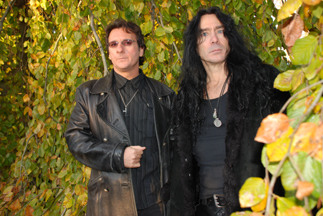 So
you are against the war in Iraq...
So
you are against the war in Iraq...
I'm against war of course.
But if somebody is coming to attack me, personally, then of course
I will fight. You know, if somebody enters my home unwanted,
uninvited, invades my people, my land, well then "I fight for
my people, my home and my land" - this kind of thing "Defiance!!
Defiance!!" (quoting
one of his songs) But I don't seek to create war, to create such
a situation, I won't cause a war, I'm not gonna come to your
home and take your oil and take your women, whatever, you know,
that kind of thing.
And so, ok, coming back
to the main question. Going into detailed stuff, for example Great
Sword Of Flame and The
Fire God, these songs, where do they come from? Did they
come up from some other readings you had? Did they come up from
Delphic religion?
Great sword of flame was the vengeance,
the anger of Klytemnestra. The Fire God actually started
life much earlier, but then I transformed the lyrics to fit the
story. I wanted the passion of the sister, Electra, to come forth
- she was much stronger then Orestes and I like the idea
of strong women; it's a personal interest of mine: strong women.
I believe in the equality of the sexes and I don't go on with
the thought, you know, like this: -I'm the man so I must be so
macho-. This kind of thing and that women are lesser or weaker
in some way. So she's the one who kind of kicks Orestes' ass
to wake up: -Get up off your ass! Stop moping around, stop being
depressive, and let's do something about this shit, let's get
the glory of our house back-. I mean, maybe she is misguided,
but she feels that power, that passion.
She is the mind, he is
the arm.
Yeah,
she is.
When you said "the rage
of Klytemnestra",
Elena wanted to make a reference to another particular being:
Have you heard about the Alastor? It's a jinn, an evil spirit
that haunts Atreus' blood. It's an evil created by the death
of the son of Tantalus.
How do you spell it?
A-L-A-S-T-O-R.
I don't remember
this.
About the story...for example,
in your final Orestes dies.
Yes, it doesn't happen in Aeschylus. That
is my invention.
I didn't get it exactly: how
does it happen? Does he commit suicide?
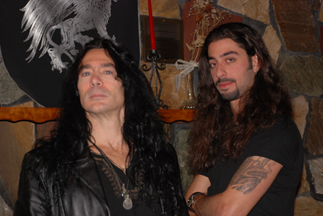 He
kills himself. He is forgiven by everyone else, but he can't
forgive himself. So he says: -Ok, my time in this body, in this
sphere of existence is finished and I will die and come back
and be reborn. It's a sort of perennial dying and resurrecting
god-man myth, like Adonis, like Mithras, like Dionysus, like
Christ. So he's perhaps another version of Dionysus or Christ
or somebody like this, for me. And also Cassandra for me is another
version of my Emalaith, my idea of her and the story. So I tried
to intertwine some of what I was doing with The
Marriage Of Heaven And Hell and Invictus albums,
with The House Of Atreus. I wanted to combine my own
sort of mythology with these things. Cause ultimately, these
works are not, as you can see, a historical lesson. It's my intention
to say: "Ok, let's think about what's happening today, because
reality is poetic and very twisted. I always attempt to put my
own life is into these works. Especially, of course, in Visions
Of Eden more than ever before. It's not obvious to any one,
even the people who are in there: that's intentional, it can't
be so obvious you can't always leave yourself wide open, because
then... it's not healthy for you.
He
kills himself. He is forgiven by everyone else, but he can't
forgive himself. So he says: -Ok, my time in this body, in this
sphere of existence is finished and I will die and come back
and be reborn. It's a sort of perennial dying and resurrecting
god-man myth, like Adonis, like Mithras, like Dionysus, like
Christ. So he's perhaps another version of Dionysus or Christ
or somebody like this, for me. And also Cassandra for me is another
version of my Emalaith, my idea of her and the story. So I tried
to intertwine some of what I was doing with The
Marriage Of Heaven And Hell and Invictus albums,
with The House Of Atreus. I wanted to combine my own
sort of mythology with these things. Cause ultimately, these
works are not, as you can see, a historical lesson. It's my intention
to say: "Ok, let's think about what's happening today, because
reality is poetic and very twisted. I always attempt to put my
own life is into these works. Especially, of course, in Visions
Of Eden more than ever before. It's not obvious to any one,
even the people who are in there: that's intentional, it can't
be so obvious you can't always leave yourself wide open, because
then... it's not healthy for you.
So when you chose that
in the end there is the "Resurrection day".
A resurrection of sorts,
that's the long line of thought we were talking about.
So Orestes cannot decide
for himself, I mean he decides to commit suicide but he's not
able to die, cause the Gods decide to resurrect him.
In a sense this is what happens, or he's reborn, perhaps, but
he has a conscious memory of his former life, instead of it
being erased.
So he cannot escape his
fate?
Yes. You can't escape your pain, your fate…you
have to live with it in yourself. Ok, I fucked up; how can I
do better the next time? This kind of thing. I like the
idea of the eternal consciousness of the universe, I think there
is a consciousness in the universe, I think the earth itself
and the universe is alive, it is a living organism, like an amoeba,
like a plant, like a human being. I think we are the flesh and
our bodies are made as the microcosm of the universe. The stars,
the Sun, the air and everything.
 All
are one.
All
are one.
Yeah. We're all
part of it. So, if you took off a limb from the tree, it doesn't
kill the tree, and the tree is still alive and it spurts a new
one in place of the one it lost.
So it is for human beings,
is that what you mean?
Yes. I am a humanist, I love
humanity, but I don't always like people. Sometimes I seek the
company of animals instead of people. But I believe in humanity
and I believe in the divine in women and men.
And. When you mentioned
your German production on stage were you mean your collaborations
with the theatrical director Weyers?
Yeah! He called me up on the phone
and he said: -I want you to write something like an opera-. Yeah,
those were his exact words.
So, how was it in Germany?
Did you have this play in 2001, right?
The first one came out
in the 1999-2000 season. I forgot which year it was exactly,
but it was one or the other. It was very close, it was summer
and I had written of course the entire thing, the entire three
CDs, but we didn't release it all right away because I was still
recording everything, but the songs were all written at the same
time. So I had the whole body of the Work to draw from. The
Wine of Violence and
all the things that appeared in the second CD, were in the production
on stage. And it was two and a half - three hours long, it was
quite long. They sang the songs in English, but there were spoken
dialogues in German.
Is this video available?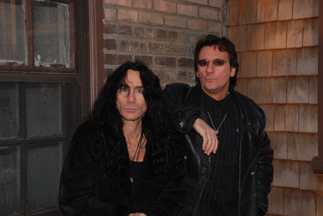
No,
no. I have videos from it and when we do or, better, when I do,
the DVD for Virgin Steele, it's not gonna be some stupid little
thing of one live concert with a bit of bullshit backstage, drinking,
farting. It's gonna be a complete historical perspective, and
a very long one, and I will include the three separate operas
I did: House Of Atreus, also I did one from The Marriage
of Heaven and Hell and Invictus albums,
and then I did Visions Of Eden, as a piece called Lilith in Germany,
in the same theater, with Weyers directing the stage presentation.
First the House Of Atreus, then we went back and explored what
I had already written for Marriage one, Marriage
two and Invictus and wrote an opera around this.
And what came out was a sort of Nordic, dramatic piece and the
production was almost like a comic
book, with that kind of costume approach.
Yeah, I read it was very
simple and direct, was it?
It was, yes. It wasn't my
favorite of the three. The interpretation was very strange. Then
came Visions
of Eden, as Lilith, the piece. For that we had
a very interesting stage set up. The stage was like a mountain
and came down into the first row of the audience. It was very
difficult to walk on, you had to be careful. There was a big
gate in the back that opened and closed and we had a film that
sometimes went on behind the actors, and flames…
So it was not simple.
No,
it was not simple. And some of those pieces of music used in
the stage production haven't come out yet. I wrote sixty
or more songs for "Visions
Of Eden" and
then I had to condense it to those eleven that appear on the
album. I wanted to release a box set, a triple CD, but the record
company would not let me do this. They thought I was out of my
mind!-
It must have been really
difficult to choose.
It was very difficult, yeah!
But I'm working on the rest of the tracks and they'll come out.
Is it still.
It's a continuum
from the idea of the story: it's more, maybe, the manifestation
into the reality of it. Of course, if you read what Lilith - Visions is
about, everything that happens in Visions of Eden, happens
in the mind of a modern day 21st century woman; actually, she's
in the middle of being raped. So she flashes back in her mind
to the ancient Sumerian time of Sophia, Lilith the Goddess, when
a Goddess was worshipped, around the Mediterranean, around here,
where we are today. And how she was pushed out of her rightful
place in the Spiritual Realm by first the rise of a father God
principle, as it came down from the north with those who believed
in the Nordic Myths and then of course with Zeus, these
kind of ideas. And later, the next nail in the coffin was the
rise of Yaweh, Jehova, this kind of thing. They ripped the feminine
divine out of spirituality. The album is about the death of paganism
and Gnosticism, and the eradication of the female principle. Visions
Of Eden is a very heavy album. The next abum will continue
on to the present day, what is actually happening to her. It's
very dark.
It's dark and crude. I
mean it's all about the truth. It's a spiritual form of what's
happening. And, just another question about the representation
in Germany:
were the cruel and bloody events represented on stage during
the performance?
Yes. Very outrageous costumes
and face painting and such... yes there was the killing of Klytemnestra,
there was the killing of Agamemnon on stage. And the death of
Orestes.
Was there dancing as well?
Yes,
there was.
Another question about
the lyrics: you added references about "angel's blood", "angel's
wings" in both the
first songs of the two CDs, in Kingdom Of The Fearless and Wings
Of Vengeance . Was it a peculiar choice?
Let
me think of the lyrics... in Kingdom
Of The Fearless?
"The angel of death, black
wings caress your kingdom of lies, immortal youth dies!!"
Oh,
yes!!! Eh eh eh!! Thank you for reminding me!!! You know, it's
the idea of his all-accomplishing power, of doom and destruction.
Agamemnon is in a rage: -Lord Priam, I'll tear your head!!- It's
so brutal. Have you seen the movie Troy?
It's so brutal when they finally break through. And this was
written long before the movie. If it happened - and it's
quite possible that it did happen - it was a very horrific thing:
ten years of cruel war. Of course every war is quite cruel and
so unnecessary. We were on the plane coming over, I was thinking
of course about September 11th, and bombings and what's going
on in the world. Why? You know, who cares what you really believe
in? Why do we have to kill each other to make our point? If you
are so strong in your beliefs, it doesn't, or it shouldn’t
matter if someone else doesn't believe in what you do,… what
you believe in. You believe your thing, I believe my thing; and
this is what was nice about paganism - I'm not trying to say
that paganism was the golden age: they had their problems too.
But essentially, I believe that it often was more accommodating.
When trying to fight with the Pagans, the Christians used to
say: we can't argue with these pagans, they're always disagreeing
with us”! I think that we can all seek the divine in our
own way and time.
You're saying that paganism
was much more tolerant than other religions. I think the Romans
were an example, cause they did not suppose that the others were
taking their religion. Everyone was worshipping his own Gods.
Yes.
Call it a different name, but it's the same idea. And this is
what I'm trying to say in Visions. And I try to explain the roots
of organized religions, where they came from. So, yeah, that's
all part of the general mood of the thing. Also…I don't
think that angels
are necessarily nice creatures.
That one was an angel of
death.
Yeah.
We were thinking that in
Greek mythology there are no angels, I mean, so we were wondering
if it was a specific choice. Is it a representation of Hades,
for example?
What it is, is that I try
to practice what I preach. I cross pollinate poems and make references
to all the things that I have learned or studied; because I don't
compartmentalize: -I don’t say…Oh, this is Sumerian,
this is Greek, this is Nordic-. It's all the same to me. Not…this
is Christian, this is Judaism, this is Islam: it's all the same.
So I join it all together.
It's spirituality.
You can
call it whatever you want; just don't call me late for dinner!
Eh eh! That's it!!
Was it a choice that all
roles (also feminine roles) were represented with your voice
and not, for example, asking for a female singer?
The answer
of course is: it's rock
'n' roll! It's not coming completely from the historical
side. Yes, I'm the singer of Virgin Steele and I did not want
the album to be kind of hijacked by all sorts of guest
singers. I wanted it to be a Virgin Steele album and it was
done in the same spirit of an album like The
Who's Tommy which actually had three different
singers on that, because they all sing, but the Virgin Steele
don't sing: so…it's just me. So I do it myself. Also
I wanted the album to be received on several levels. One, you
can take it as the concept and understand it from what is actually
being said, formally, directly, or you can just enjoy it as
a piece of rock music. And that's it: very simple, nothing
more.
I think it was both.
Yeah,
I tried to make it both and to have a universal quality. That
is what I tried to bring to it. And it should be understood that
Virgin Steele is a very closed society. We don't invite many
people in to participate with us: we just try to explore the
strength of the band as it is and we do the best we can. We push
ourselves, I push myself to feel the emotions to create, etc
- the band push themselves to play all these different feelings/attitudes
and it comes out, and it's a Virgin Steele album. It's not Virgin
Steele plus the London Philharmonic and every rock singer on
the cover of Rock Hard magazine in there. It is simply us and
that’s all.
Ok, that's all! Thank you
very much for everything!
You're welcome! By the Gods & Goddesses!
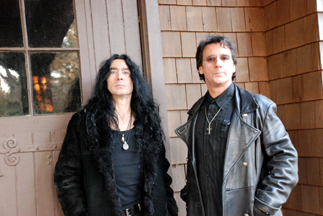 DOCKYARD
1 will be re-releasing the classic VIRGIN STEELE albums Noble
Savage and Age Of Consent. Both albums will be
re-mastered, and feature previously unreleased Bonus Tracks,
and new full color booklets with new photos and commentary/liner
notes. Said David DeFeis, “The purpose of these re-issues,
is not necessarily to have the Fans who already purchased them
buy them again, but attempt to reach out to those who have
not yet heard of Virgin Steele. I am happy to
once again be working with Dirk Putzke and Christine Stephan.
I have known them for a long time now, and our association
has always yielded exciting, positive results, and been absolutely
great! I look forward to a very Magickal year ahead with them.”
DOCKYARD
1 will be re-releasing the classic VIRGIN STEELE albums Noble
Savage and Age Of Consent. Both albums will be
re-mastered, and feature previously unreleased Bonus Tracks,
and new full color booklets with new photos and commentary/liner
notes. Said David DeFeis, “The purpose of these re-issues,
is not necessarily to have the Fans who already purchased them
buy them again, but attempt to reach out to those who have
not yet heard of Virgin Steele. I am happy to
once again be working with Dirk Putzke and Christine Stephan.
I have known them for a long time now, and our association
has always yielded exciting, positive results, and been absolutely
great! I look forward to a very Magickal year ahead with them.”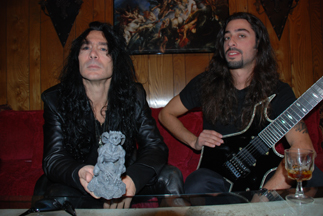 Lately
there has been a flurry of activity. David has recently completed
work for a track on the forthcoming Ep from the female fronted
Polish Power Metal Band CRYSTAL VIPER.
Lately
there has been a flurry of activity. David has recently completed
work for a track on the forthcoming Ep from the female fronted
Polish Power Metal Band CRYSTAL VIPER. 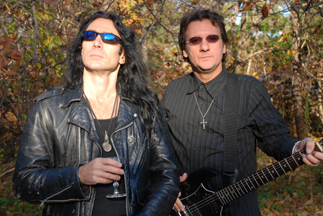

 So
you are against the war in Iraq...
So
you are against the war in Iraq... He
kills himself. He is forgiven by everyone else, but he can't
forgive himself. So he says: -Ok, my time in this body, in this
sphere of existence is finished and I will die and come back
and be reborn. It's a sort of perennial dying and resurrecting
god-man myth, like Adonis, like Mithras, like Dionysus, like
Christ. So he's perhaps another version of Dionysus or Christ
or somebody like this, for me. And also Cassandra for me is another
version of my Emalaith, my idea of her and the story. So I tried
to intertwine some of what I was doing with The
Marriage Of Heaven And Hell and Invictus albums,
with The House Of Atreus. I wanted to combine my own
sort of mythology with these things. Cause ultimately, these
works are not, as you can see, a historical lesson. It's my intention
to say: "Ok, let's think about what's happening today, because
reality is poetic and very twisted. I always attempt to put my
own life is into these works. Especially, of course, in Visions
Of Eden more than ever before. It's not obvious to any one,
even the people who are in there: that's intentional, it can't
be so obvious you can't always leave yourself wide open, because
then... it's not healthy for you.
He
kills himself. He is forgiven by everyone else, but he can't
forgive himself. So he says: -Ok, my time in this body, in this
sphere of existence is finished and I will die and come back
and be reborn. It's a sort of perennial dying and resurrecting
god-man myth, like Adonis, like Mithras, like Dionysus, like
Christ. So he's perhaps another version of Dionysus or Christ
or somebody like this, for me. And also Cassandra for me is another
version of my Emalaith, my idea of her and the story. So I tried
to intertwine some of what I was doing with The
Marriage Of Heaven And Hell and Invictus albums,
with The House Of Atreus. I wanted to combine my own
sort of mythology with these things. Cause ultimately, these
works are not, as you can see, a historical lesson. It's my intention
to say: "Ok, let's think about what's happening today, because
reality is poetic and very twisted. I always attempt to put my
own life is into these works. Especially, of course, in Visions
Of Eden more than ever before. It's not obvious to any one,
even the people who are in there: that's intentional, it can't
be so obvious you can't always leave yourself wide open, because
then... it's not healthy for you.  All
are one.
All
are one. 